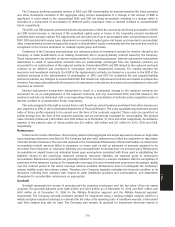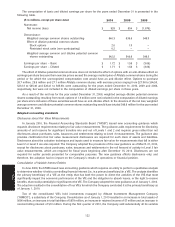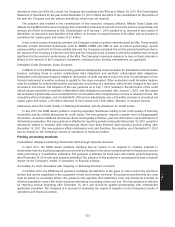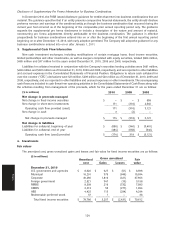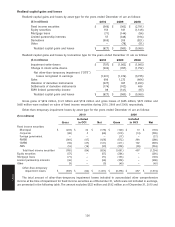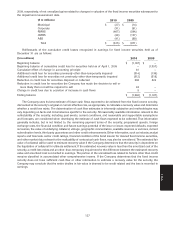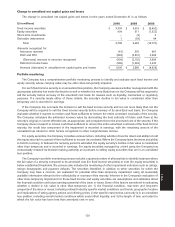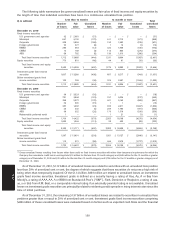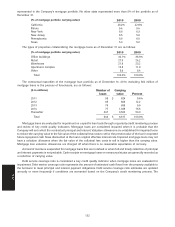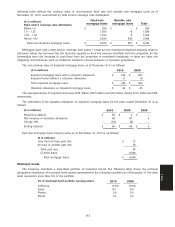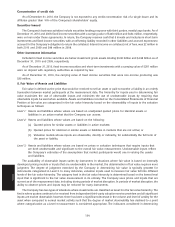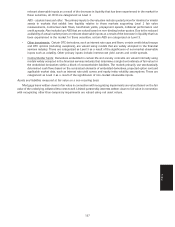Allstate 2011 Annual Report Download - page 207
Download and view the complete annual report
Please find page 207 of the 2011 Allstate annual report below. You can navigate through the pages in the report by either clicking on the pages listed below, or by using the keyword search tool below to find specific information within the annual report.
2009, respectively, of net unrealized gains related to changes in valuation of the fixed income securities subsequent to
the impairment measurement date.
($ in millions) 2010 2009
Municipal $ (27) $ (10)
Corporate (31) (51)
RMBS (467) (594)
CMBS (49) (127)
ABS (41) (89)
Total $ (615) $ (871)
Rollforwards of the cumulative credit losses recognized in earnings for fixed income securities held as of
December 31 are as follows:
($ in millions) 2010 2009
Beginning balance $ (1,187) $ —
Beginning balance of cumulative credit loss for securities held as of April 1, 2009 — (1,357)
Cumulative effect of change in accounting principle 81 —
Additional credit loss for securities previously other-than-temporarily impaired (314) (136)
Additional credit loss for securities not previously other-than-temporarily impaired (312) (518)
Reduction in credit loss for securities disposed or collected 638 824
Reduction in credit loss for securities the Company has made the decision to sell or
more likely than not will be required to sell 43 —
Change in credit loss due to accretion of increase in cash flows 5 —
Ending balance $ (1,046) $ (1,187)
The Company uses its best estimate of future cash flows expected to be collected from the fixed income security,
discounted at the security’s original or current effective rate, as appropriate, to calculate a recovery value and determine
whether a credit loss exists. The determination of cash flow estimates is inherently subjective and methodologies may
vary depending on facts and circumstances specific to the security. All reasonably available information relevant to the
collectability of the security, including past events, current conditions, and reasonable and supportable assumptions
and forecasts, are considered when developing the estimate of cash flows expected to be collected. That information
generally includes, but is not limited to, the remaining payment terms of the security, prepayment speeds, foreign
exchange rates, the financial condition and future earnings potential of the issue or issuer, expected defaults, expected
recoveries, the value of underlying collateral, vintage, geographic concentration, available reserves or escrows, current
subordination levels, third party guarantees and other credit enhancements. Other information, such as industry analyst
reports and forecasts, sector credit ratings, financial condition of the bond insurer for insured fixed income securities,
and other market data relevant to the realizability of contractual cash flows, may also be considered. The estimated fair
value of collateral will be used to estimate recovery value if the Company determines that the security is dependent on
the liquidation of collateral for ultimate settlement. If the estimated recovery value is less than the amortized cost of the
security, a credit loss exists and an other-than-temporary impairment for the difference between the estimated recovery
value and amortized cost is recorded in earnings. The portion of the unrealized loss related to factors other than credit
remains classified in accumulated other comprehensive income. If the Company determines that the fixed income
security does not have sufficient cash flow or other information to estimate a recovery value for the security, the
Company may conclude that the entire decline in fair value is deemed to be credit related and the loss is recorded in
earnings.
127
Notes




